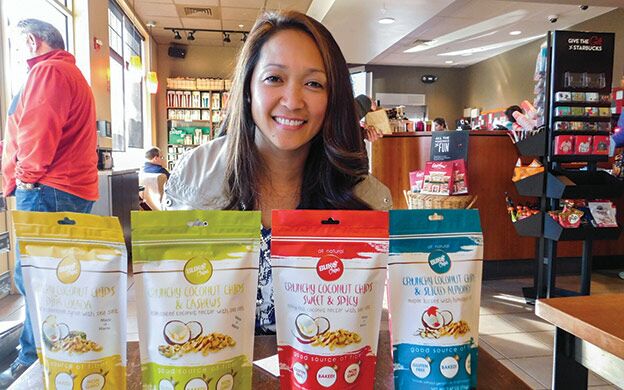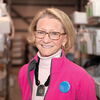Business advice that's free and anonymous
They come to be judged without being pre-judged. That's the premise of the House of Genius, where 10 panelists from firemen to financiers share business advice based on a single question presented by each of two entrepreneurial companies.
But there's a twist: through the initial company presentations and the feedback, not one knows who the panelists/judges are or anything about their profession. The idea is equality, the notion that a good idea or feedback can come from any quarter of society. And indeed, some of the advice has.
Jess Knox, founder of Maine Startup and Create Week, who spearheaded the effort to bring the international House of Genius, or HOG, movement to Portland two years ago, tells of his first HOG event in Boulder, Colo., where he expected all of the panelists to be experienced investors and founders. There are 31 HOG locations worldwide, with Portland being the smallest.
“This is where the magic of HOG resides,” Knox tells Mainebiz. “There was one particular person who gave incredible feedback and advice to the company that pitched that day … at the end of the event there was a big reveal of who was who and what they did. I expected that the person I thought was so awesome would be some amazing investor or founder — low and behold — he was a professional firefighter.”
Knox and Ann Marie Swenson, senior vice president and regional manager of business banking at People's United Bank, are part of the HOG Steering Committee, which attends and evaluates each event and sets up the next one. Earlier presenters include Maine Works, Flow Fold, Black Dinah Chocolatiers, Garbage to Garden, Maine Foodie Tours, Rising Tide Brewery, Rapport and Maine Mead Works.
Panelists vary month-to-month, but those who gave feedback to the two presenters at the Oct. 18 session included: Michael Sosnowski, Maine Home Connection; Elizabeth Frazier, Pierce Atwood; Nick Kaufmann, freelance consultant; Paula Lundgren, Brainstorm Business Services; Cheryl Brandt, Pemberton & Associates; Kristen Milliken, ADHD Resource Hub; Nicola Chin, Up With Community; Rahul Bhattacharyya, researcher at the Massachusetts Institute of Technology's Auto-ID Labs; and Keith McBride of Freeport Economic Development.
Meetings are held the third Tuesday of each month and are by invitation only. Everything is off-the-record. Panelists and presenters apply online and are selected by the steering committee. Presenting entrepreneurs must be post-revenue. The meetings are held at the Cloudport CoWorking MultiSpace in Portland, and begin with one company presenting itself and its key question for about five minutes. Panelists then have about 10 minutes to question the presenter for clarification. Then each panelist gives feedback for a minute or so, during which the presenter must remain silent. Then there is an open discussion.
After a short break, the second company goes through the same process. Toward the end the panelists reveal who they are and what they do.
“Anonymity is key to ensure all feedback is accepted by the presenters on an equal basis,” says Swenson of People's United. “The best feedback often comes from people with no connection to the entrepreneur's industry. We try to have diverse panelists, those who aren't too famous and those who don't know each other.” Panelists are told not to dress in their usual work clothes so their profession isn't easily discernable. They learn who the presenters are upon arrival, but do not know the names of the other panelists until the end of the discussion.
She says the format is similar to ABC's “Shark Tank,” except the businesses are seeking advice versus funding, and there's an upbeat feel to the meeting. The presenters don't have to hear the familiar Shark Tank rants, “you're dead to me,” or “I'm out,” by Boston's own Kevin O'Leary.
“One of the things they said is this isn't like 'Shark Tank,'” says panelist Chin of Up With Community. “We try to build people up, not cut them down and not have the people giving advice one-upping each other.”
Of the anonymous aspect of panelists, Chin says, “Maine is a small place where a lot of people have pre-conceptions of others. Having a level of anonymity helps them learn my ideas without preconceptions.”
People on the panel ended up having diverse backgrounds in sales, marketing and even psychology.
“It felt very collaborative,” adds Brandt of Pemberton & Associates, a Portland-based recruiting and consulting firm. “You gain from everyone who presents. New ideas are stimulating. The comments were so well thought out for a short period of time.” She says the event always leads to meeting more people, for example, presenter Lorraine Fagela wanted to meet someone at Bixby & Co. (Bixby Bars) and did.
“This is a different type of presentation. You wouldn't do this presentation to a venture capitalist,” says panelist Paula Lundgren, president of Brainstorm Businesses Services of Biddeford. “They [the presenters] are looking for advice to enhance their marketing or go to international markets.”
There are other organizations that help entrepreneurs, including SCORE, which offers up mentors on various industries, and Women Standing Together, where everyone knows one another and typically responds to a single presentation.
Good advice, for free
The two presenting companies get coached before the meeting, including help from the HOG steering committee on how to ask the best question and how to best show their company's product or service.
“I appreciated the coaching session with Ann Marie and Gigi [Guyton, southern regional manager and microbusiness specialist for New Ventures Maine] a few days before the HOG presentation,” says presenter Fagela, founder of Buko Chips, a coconut snack chip that is a product of Cornerstone Food Co. of Falmouth. She was one of the two presenters Oct. 18. “They spent some time with me to go through my presentation and make sure that I pinpointed and was specific with my question to ask.” Buko means coconut in her native Tagalog language.
Fagela, who has a business background and hails from the Philippines, has lived in Maine for three years. She launched four flavors of her chips in January 2016, and has self-funded the company in a rented commercial kitchen in Falmouth. She sells in 15 stores in Maine, including Bow Street Market in Freeport and Lois' Natural Marketplace in Scarborough.
Her question about the company she and her husband run was how to expand throughout New England and the United States. Many of the panelists told her not to expand right now.
“One panelist said to keep putting the product out in Maine and New England and keep reaching out to contacts,” Fagela says. “I had a lot of takeaway from HOG. I'm refining my business plan so I can keep changing to meet my goals.”
Ongoing connections
Besides suggestions, connections are a big part of HOG.
“They continue to think about my ask [question] day-to-day,” Fagela says. “They're sending me referrals. I'll have a follow-up with Nicola [Chin of Up With Community].”
Chin, a transplant from Chicago, has a consultancy in Lewiston that helps companies with strategic plans and visions. She is among the panelists who advised Fagela to stay focused on Maine, at least for now.
“I don't think she's saturated the Maine market and tested it enough to scale her processes to the regional level,” Chin says. “As a leader you need to know what you're good at — what you do as a founder and what to delegate. She likes building a business and she has a passion for food.”
At some point Chin and other panelists say that in order to grow, Fagela will have to hand over some of the cooking to someone else who may not be as good as Fagela, but who nonetheless can make a marketable product while Chin focuses on marketing and growing the business.
“She may want to penetrate Maine first and make a name here,” says Rahul Bhattacharyya, a research scientist at the Massachusetts Institute of Technology's Auto-ID Labs, a Maine resident who commutes to Cambridge, Mass., three times a week. “I can see maple chips and 'Made in Maine,' but not coconut in California. Why is 'Made in Maine' cool?” he asks.
Bhattacharyya added that he was impressed by how well people are connected in Maine's entrepreneurial community. “They recommended resources I didn't know about,” he says.
Targeting customers
For Deep Blue Design LLC of Scarborough, which makes the Pakpod tripod with adjustable pitons at the tip of its legs, the question was how to use their current assets to effectively drive sales through the rest of this year.
The young company, which had a successful $124,000 Kickstarter campaign starting in October and received a $24,400 seed grant from the Maine Technology Institute with an equal match to develop a second-generation Pakpod Pro model of aluminum alloy and stainless steel, nonetheless ran into a wall in the summer, when sales slumped.
The company had sold 2,000 units of its $99 plastic Pakpod, which video and camera enthusiasts use underwater and for time-lapse photography, but then ran into the typical July lull in the retail cycle. At the same time, says founder Steve Underwood, the company had gotten an inventory of 2,500 tripods from its Chinese manufacturer, which it needed to sell, fast.
While it has distributors in the United States and several other countries, the HOG panelists suggested better identifying its target customers and using existing enthusiasts and bloggers to get the word out about the product.
Underwood, an underwater videographer, discovered the panelists didn't fully understand the product's distinctions, so he changed his website to show the tripod in use.
“We weren't communicating the difference between our product and the others on the market,” he says. “The panelists compiled notes and sent them back. It's like getting feedback from a potential customer.”
Read more
Will Maine Startup and Create Week spark an 'innovator invasion'?
Startup & Create Week hitting the road with national event series












Comments